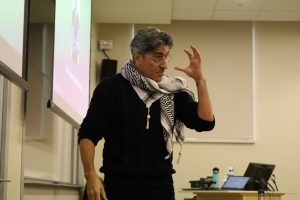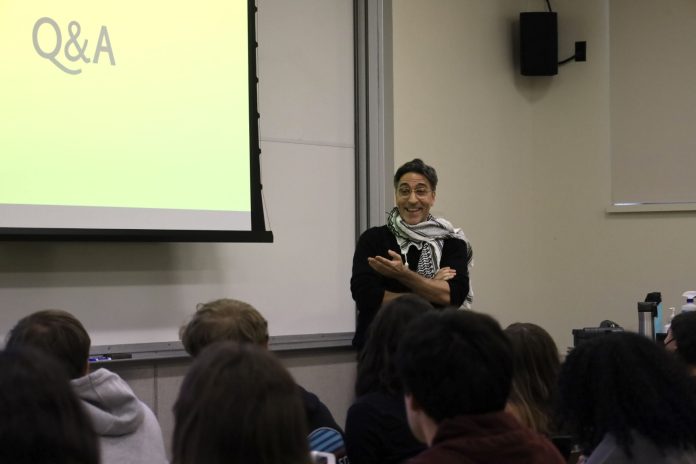Friday, Dec. 1, the College of William and Mary’s W&M Dissenters hosted Sultan Qaboos bin Said Chair of Middle East Studies and professor of Arabic Studies Dr. Stephen Sheehi for a teach-in on settler colonialism. The teach-in focused on the social constraints set by settler colonialism, Sheehi’s perception of Zionism and the current events of the Israeli-Palestinian conflict. Assistant professor of sociology and gender, sexuality and women’s studies Diya Bose briefly spoke as well.
The W&M Dissenters are a chapter of the national Dissenters youth movement, “We are Dissenters.” A member of the College’s chapter described the group’s purpose on campus.
“We are a coalition, we are a collective of students,” The member said. “And all we are is that we’re against institutionalized oppression of all forms. And we’re also, most importantly, a safe space on this campus for communities that have been historically and presently are still being mistreated by institutional powers on this campus and beyond it.”
A student organizer began the teach-in with the College’s Land Acknowledgement and its Statement on Slavery and its Legacies prior to presenting its speaker, Sheehi.

Sheehi first shared that he intentionally did not plan anything formal. For a casual Friday afternoon discussion, Sheehi said he had not expected such a large turn-out of students and professors.
While addressing the broader topic of settler colonialism, Sheehi was upfront that he was speaking about Palestine and Israel as a settler-colonial society.
“When we talk about Israel as a settler-colonial society, we have to understand we are not exclusivizing it,” Sheehi said. “We’re historizing it. We’re contextualizing it. There are many other settler-colonial societies, and in many ways Israel mimics that.”
Sheehi asserted that settler colonialism is not identified by an event but rather is an enforced infrastructure.
“It’s the structure by which the settler state built its authority,” Sheehi said. “And the logic of all settler-colonial states is fundamentally to eliminate the Indigenous person.”
Sheehi focused on Zionist ideology in Israel and its role in settler colonialism. He was clear about his use of the term, citing other possible interpretations.
“I’m talking about Zionism as a political ideology that was founded at the end of the 19th century, largely by secular European Jews,” Sheehi said.
As a non-Jewish person, Sheehi was unwilling to speak on what Zionism means or does not mean to Jewish people. However, Sheehi argued that, as an expert in the field, it is a fact that people have lived in Palestine territory well before 1948.
“When I talk about Palestine, I’m talking about all of Palestine,” Sheehi said. “What is meant when they say, ‘river to the sea’ is that there are Palestinian people. They have been there for centuries. It is a dynamic and diverse culture and society. And it’s that claim, the existence of those people, which is negated.”
Bose then shared her connection to the Israel-Palestine conflict. In South Asia, where her family is from, colonial policy generated famines that directly impacted her grandparents. Bose quoted a powerful monologue by Alaa Hajjaj from the Gaza Mono-Logues collected in 2010.
Following the talk, Sheehi and Bose answered several audience questions.
Students expressed their safety concerns and asked for tips on how to educate family and friends. Sheehi felt that just action on the part of the College administration is crucial for student safety.

“It’s tough,” Sheehi said. “We have to hold out, we have to push our administrators to be able to treat us fairly and to advocate for us.”
Sheehi reflected on the purpose of the event, noting the sense of solidarity between attendants from different organizations.
“A lot of cultural organizations on campus have advertised this event because global struggles, struggles of oppression, struggles of colonialism affect people of color disproportionately, and we’re all affected by that,” attendee Carolyn Reid ’27 said. “And so that’s why I think you see a lot of people showing up for events like this because we understand what it is to be under siege or under colonial rule.”
Several student organizations supported W&M Dissenters by sponsoring the event, including the College’s Middle Eastern Student Association, the Asian American Student Initiative, Students for Justice in Palestine, Political Latinxs United for Movement and Action in Society, Black Student Organization and more.
Audience members appreciated Sheehi’s lecture, noting the value of the information he shared.
“I think it’s really powerful that Professor Sheehi was willing to speak about this issue, especially being like one of the only professors that I’ve heard actually take a vocal stance against genocide and against violence and Gaza and Palestine throughout the Middle East,” attendee Lena Bullard ’26 said.
Reid attended the event, hoping to stay informed on the evolving conflict.
“I think when we’re engaging in conversations around the clock, it’s very important to be educated and to come in with a holistic perspective,” Reid said.
CORRECTION (12/6/23): This article was updated by Sarah Devendorf, the Standards and Practices Editor to remove two mentions of the name of a member of the group who did not want their name to be included in the article. The name was also removed from the article’s tags. Additionally, William and Mary dissenters does not have an executive board or any leadership so that detail is now reflected in the article after corrections were made.

